
Ten years ago on a school field trip two vans filled with two teachers and multiple students crashed into a ravine, leaving only nine students alive. Most of the survivors are not friends with each other, but the tragedy forges a bond between them that intensifies when a year after the disaster one of the survivors kills herself. To make sure none of them are alone again on the anniversary of the accident, the remaining eight survivors agree to spend the anniversary week together at a beach house. However, a decade on and survivor Cassidy Bent isn’t sure she wants to attend this year’s event. She has created a new life for herself, one that includes her boyfriend and not the seven people she was been forced into a relationship with where the only thing they have in common is a tragedy.
That is until she receives devastating news that another one of the survivors, Ian, killed himself and Cassidy finds herself speeding towards the beach house on the Outer Banks. But once she arrives she quickly notices that not everything is what it appears to be and when fellow survivor Amaya disappears on the first night of the week she begins to feel that something is amiss. As each survivor relieves the terrible events of that fateful day, secrets that they had attempted to buried resurface and as the clock ticks in their search for Amaya, the survivors are forced to ask themselves, is one of them a killer?
The premise of this thriller is very interesting and the beautiful color had my hooked. Ms. Miranda does a great job of building tension that continues to increases as the days and eventually the hours tick by. I also liked how she included chapters where the disaster is seen through each of the survivor’s eyes, painting a complicated picture of the events that transpired and why their decisions continue to haunt them ten years on. I also appreciated Ms. Miranda’s portrayal of Cassidy, who the story is told from as she created a character that is clearly suffering from PTSD and is blocking out critical memories that are revealed at the very end of the story, mainly how the accident actually occurred.
Despite Ms. Miranda’s excellent tension building and plot devices, I was underwhelmed by the conclusion of the story and who the killer was. Without revealing anything I can say that the conclusion felt like the ending I read in a book I read earlier this year, In My Dreams I Hold a Knife by Ashley Winstead. While the endings are not identical, they do have a very similar plot point that, since I read Ms. Winstead’s book first, left me greatly wanting more out of The Only Survivors. Additionally, while I liked how Ms. Miranda included scenes of the disaster from each of the survivors’ point of view, the fate of two of the other students who eventually didn’t survive remains a bit of a mystery to me. I can guess what happened to them but they didn’t seem to fit in with the story of what happened. With the exception of the teachers who were killed immediately in the crash, I only know what happened to one of the other student victims and that’s because it was what the plot was centered around.
As a result this book left me a bit underwhelmed and I’m not sure if I would pick it up again in the future. It was a good concept that was executed fairly well but the ending could have been improved.
3 out of 5 stars

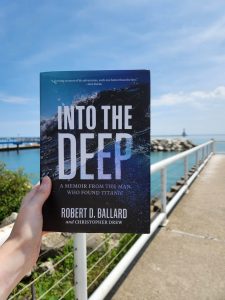
Robert Ballard had one dream as a child growing up and that was to become Captain Nemo, exploring the depths of the ocean and discovering all the treasures hidden below. It’s an ambitious dream, especially from all the setbacks young Bob faced. Yet, in this vivid account of his left, Dr. Ballard shares with the reader who, even in the face of adversity, overcame it all and found the most famous shipwreck in the world, the Titanic.
I have been fascinated with the Titanic since a small child so whenever there is a new book about the disaster or the people involved with her story I normally have to pick it up. To my surprise, while surfing the Internet one night, I discovered Ballard had published his memoir a couple of years ago and it completely missed my radar (pun intended). I immediately ordered it and began reading it. Ironically and tragically, the day I started reading this was the day it was announced that the Titan Five had all perished while attempting to visit the Titanic wreck. As a result, I was more interested than ever about Ballard’s story and his mission to discover these famous shipwrecks.
Ballard is an interesting character with quite the story. A Kansas boy that grew up in California, Ballard struggled throughout school due to dyslexia, something no one really knew anything about when he was growing up. Despite his disability, he had big dreams for his future which included becoming an oceanographer and finding famous shipwrecks.
Essentially a modern day Captain Nemo.
Despite numerous bumps and hardships, Ballard achieves his dream and begins to work on a submersible that would allow him to explore the depths of the ocean. Through repeated testing to ensure it’s safety (what a concept) and some backing from the Navy, who had a very heavy interest in this type of technology, Ballard is able set out on the journey that made him internationally famous; finding the Titanic. But the story doesn’t end there and the reader learns more about his other discoveries and achievements since.
One thing I really enjoyed about this autobiography is that Ballard is a good story teller and you really do garner the impression that he cares about the wrecks he is exploring as well as the people lost in these disasters. In particular, you can feel his disdain and frustration in individuals who explored the Titanic after him, taking her treasures and not caring what damage they caused to the wreck as they did so. For that, I really respect him.
Some parts of the book do lag a little bit and some of the scientific information was hard to digest (in particular for a non-science person) but the reader does get the gist. Another critique of the book I will make is when Ballard is discussing his first and second wife, something that other reviewers have picked up on. The main critique of this is that he is very dismissive of the sacrifices his first wife, Margie, makes and doesn’t seem to register the fact that she allowed him to go on this trips where he would be gone for weeks at a time. I can see where some would feel this way but I would point out that he does state in the book that he recognizes Margie’s sacrifices and thanks her for that. However, I will say that how he goes about divorcing his wife is pretty awful. I also didn’t appreciate how he seemingly compared his first wife to his second wife, who he had more in common with and wasn’t the “housewife” that Margie was. Both women clearly had their strengths and I don’t think Ballard should have been comparing the two, even if not directly stated.
Overall, this is an excellent resource for individuals wanting to know more the man who discovered Titanic, and the various other adventures he went on. One can certainly say that Dr. Ballard achieved his dream.
4 out of 5 stars


Lux and her boyfriend, Nico, might be living in paradise but they are far from living the life they had hoped. When Lux met Nico and he invited her to see the world, she hadn’t expected to be “stuck” in Maui for several months working as a maid at an upscale hotel. Still, Lux believes in Nico and knows that one deal they will leave Hawaii behind and travel the world on Nico’s boat. As it turns out, that might be sooner than they expected when Nico is approached by two American college students, Brittany and Amma, to take they to an abandon and remote island in the Pacific that has a shady history of cannibalism and WWII secrets. Upon arriving at the beautiful paradise and meeting a couple, Jake and Eliza, a dark cloud of mystery, tension, and fear settles over the group that will eventually snap into unimaginable crimes being committed.
Let’s begin with this cover. Stunning! The cover alone is enough to hook you so major points for that. The story itself is very engaging and this book absolutely does tension building perfect. From the moment Lux and Co. arrive on the island there is something that just isn’t right. Perhaps it’s the couple that are already there, or maybe it’s the island unsavory history. Yet, whatever it is, something is obviously not right and most of the book focuses on this tension growing and growing until it snaps in the last few chapters.
The premise of the book is very good and obviously takes inspiration from Lord of the Flies and, as the summary says, And Then There Were None. I have not read either books but I have read The Wife Upstairs by Rachel Hawkins and the author does do a good job of taking classics or famous stories and keeping the overall theme but making them uniquely hers. At the same time, Ms. Hawkins also provides us some flashbacks of the characters before they all meet each other, providing some interesting background on these individuals and their possible motives, adding another layer of complexity to what is going on.
Yet while the story does do good with the tension building and providing meaningful flashbacks, it does feel like at points that the story is drawn out and could have been condensed a bit, which is surprising given it is not a very long book. At times, it feels like the story stalls and one can easily find themselves glazing over some of the passages to get to the good stuff.
Another point worth mentioning as I first noticed it in The Wife Upstairs but seemed to be more of an issue with this book is that some of the characters’ motives or plot points are never wrapped up or explained. While I can’t go into this with too much detail because it will reveal spoilers, I can say that when the conclusion occurs and what has happened is explained by one of the characters, I was left with more questions and answers. Perhaps this was done intentionally but if so, I wish it would have been done in another way to at least give the reader some closure. Mainly, the plot points involving the island’s sinister nature and Amma’s true story were the two stories I wish would have been flushed out a bit more.
Overall, this book is a fun summer read and something a reader can easily finished off in a day but is not one of the best thrillers I have read.
3 out of 5 stars


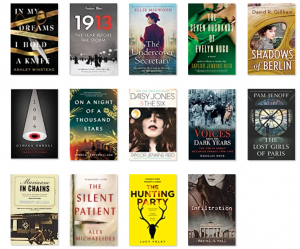
Hello fellow readers! We’re officially halfway through 2023 and time has sure flown! I’ve officially finished and graduated from Graduate School with an MBA, have published my tenth book, and managed to complete 24 books so far, meaning I’m over 50% done with my goal of reading 40 books this year. Some were excellent, others were good, and some were not what I had hoped they would be. To mark the halfway point of the year I’ve decided to partake in the Mid Year Freakout tag.
If you aren’t familiar with the Mid Year Freakout it’s a fun little questionnaire that a lot of book YouTubers partake in during this time of the year. I’ve written out the questions below with my answers and encourage you to take the quiz yourself! Now, without further ado, let’s get started.
1. Best book you’ve read so far this year. I’ve had a couple of contenders for this spot but I think it will be hard to beat The Silent Patient. The ending was chef’s kiss!
2. New release you haven’t read yet but want to. I have quite a few but the two books I want to prioritize by the end of the year is If We Were Villains by M. L. Rio and The Writing Retreat by Julia Bartz.
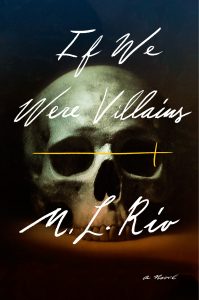

(Image Credits: Goodreads)
3. Biggest disappointment. Unfortunately I have to give this honor to Red, White, and Royal Blue. The premise was great but the delivery just fell flat for me.
4. Biggest surprise. Since it was a retelling of one of my favorite classics of all time, Jane Eyre, I did not expect The Wife Upstairs to be as a good as it was.
5. Favorite new author (debut or new to you). Rachel Hawkins has a talent for building suspense and tension, and I look forward to reading more of her books in the future (I’m currently reading another one of her books, Reckless Girls).
6. Newest favorite character. Without a doubt Vero from Finlay Donovan Is Killing It. I need more Vero in my life!
7. Book that made you cry. The ending of The Seven Husbands of Evelyn Hugo did bring out a tear or two…maybe more.
8. Book that made you happy. Despite it’s seemingly grim summary, Finlay Donovan Is Killing It is one that I will return to when I’m feeling down or need a good laugh.
9. Most beautiful book you have acquired this year. I picked up Pride and Prejudice and The Hunchbook of Notre Dame in the Seasons collector’s editions and needless to say I need more of these!
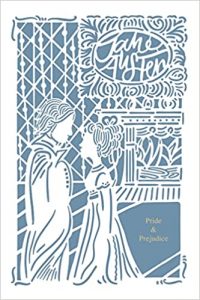

(Image Credit: Amazon)
10. What books do you need to read before the end of the year? A lot! But I’m hoping to pick up at least one dark academia book, one or two more historical fiction stories, and at least one nonfiction book.

 (Image Credit: Goodreads)
(Image Credit: Goodreads)
When Cecilia Fitzpatrick finds a letter from her husband, hidden in their attic and designated as only to be read if he dies, Cecilia is more than a little bit intrigued. What could her loving husband, John-Paul, want to tell her that he can’t when he is alive? When she does decide to disregard John-Paul’s request and open his letter, she unburies a secret that involves two other women in her community.
Rachel Crowley has been living with every parent’s worst nightmare for years. Her daughter, Janie, was brutally murdered when she was in high school and her murder remains unsolved although Rachel is convinced that the school’s PE teacher, Connor Whitby, is responsible and she’s determined to make sure he is brought to justice.
Tess O’Leary isn’t even supposed to be in the picture but when her husband and cousin reveal they are having an affair, Tess packs up her son, Liam, and goes home to her mother to lick her wounds and decide what she’ll do next. But when she runs into her old boyfriend, Connor, her situation becomes even more complicated.
All three women are on a collision course that will lead to exposed secrets and dire consequences for everyone involved.
I picked up a copy of this book on a whim when I found it at a thrift store and for what I paid for it, I’m overall happy with it. If I had paid full price, perhaps not as much. The husband’s secret is revealed fairly early on, perhaps around 25% into the book. Therefore, this story isn’t so much a mystery or thriller but rather a story that builds on tension. We spend most of the book waiting to see what Cecilia will do with her husband’s shocking revelation and how Rachel and Tess become intertwined with it. This tension is something Ms. Moriarty does really well and it did have me turning page after page.
When the tension is finally broken we get a good but somewhat flat ending. The consequence for John-Paul’s secret is terrible but it didn’t have me shocked. It was just fine (and I hate using that word if you have read the book and knows what happen but hopefully you know what I’m getting at). I did like the epilogue, revealing how secrets often have us go down paths in our lives we weren’t supposed to.
The character development is good but while on the topic of characters I am forced to ask, what is the point of Tess’ character? Cecilia and Rachel become linked and it makes sense why, but I was left wondering if the story would have had the same outcome if Tess hadn’t been involved and while a good argument could be made for why Tess was needed I just don’t see the real value Tess adds to the story. Yes she becomes involved with the person Rachel believes killed her daughter but she has no real impact on the outcome of that plot line.
This book is overall solid and a good beach read but I don’t think it will be one I return to in the future. The secrets have already been revealed.
3 out of 5 stars

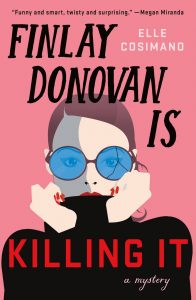 (Image Credit: Goodreads)
(Image Credit: Goodreads)
Finlay Donovan is a recently divorced mother of two little children and is far from killing it at life. She’s months behind on her newest novel, has more overdue bills than she cares to count, a garage door that won’t close, and an ex-husband dead set on receiving full custody of their two children. But, for Finlay things are going to get even more complicated. While discussing her book with her publisher at a local Panera, a woman overhears Finlay and mistakes her for a hitwoman, and she has a little problem she wants Finlay to take care of. What ensues is a hilarious tale of what one woman will do to kill it at life.
In one simple word, this book could be described as hilarious. The subject matter could be dark, but Ms. Cosimano has created a fantastic character in Finlay Donovan, a mom who has been pushed just a bit too hard and is looking for a way to keep her children out of the hands of her cheating ex-husband. Though I’m not a mother myself I do think many women can relate to Finlay’s struggles, as well as her humor about her situation. Finlay knows what she is doing is wrong, but isn’t your husband cheating on your real estate agent also just as bad?
Finlay is soon joined by her babysitter, Vero. This college student is probably my favorite character in the story. She’s sassy, self assured, and her humor is one of my favorite aspects of this book. These two oddball characters find themselves in deep trouble when a well meaning bartender and a young, ambitious detective become involved, only complicating the plot but also providing more insane situations that Finlay and Vero have to get out of.
There is truly nothing I didn’t dislike about this book. It could be argued that the plot if predictable and that it’s not necessarily a deep mystery where you have to guess the killer. Nonetheless, it is one of those books that you can fly through and, if you are down and having a bad day, it will immediately put you into a better move. For that, I loved this book and believe it might become one of my favorite books moving forward.
5 out of 5 stars

Hello fellow readers! Here is the last teaser for Infiltration, which you can now pick up and if you haven’t, make sure you do 
 Infiltration ©Rachel R. Heil 2023
Infiltration ©Rachel R. Heil 2023
Ernst never looked forward to his meetings with Bruckmann but now he enjoyed them even less. Since hiring Lina, Bruckmann had been on Ernst like an annoying nit that wouldn’t go away.
“Has she said anything that could link her with the Brotherhood?” Bruckmann’s sweaty face was inches from Ernst, who resisted the urge to smack it away.
“No,” Ernst replied. “She’s being careful, if she is involved.”
“If?” Ulrich looked at his friend, his skin crawling with frustration. “Ernst, she’s involved. You said so yourself.”
“Pardon me,” Ernst rolled his eyes in exasperation. He was beginning to wish he hadn’t come up with the idea in the first place.
No, he didn’t mean that for as much as Ernst knew he had hired Lina to fulfill an investigation he also knew that he was beginning to like her. She was the first person in a long time that Ernst enjoyed seeing. She was kind to him, willing to humor his stupid jokes, and tease with the same ruthlessness he gave out. For the first time in many years, Ernst looked forward to going into work.
“I have Mielke breathing down my neck about this case,” Bruckmann forced his fat body down onto his chair. “Maybe if she worked for me we would be getting somewhere.”
Ernst cringed at the idea of Lina being anywhere near his ugly, obese, lustful superior. She didn’t deserve that. Nobody deserved that.
“These things take time,” Ernst retorted. “She’s playing it safe, gaining my trust. She’ll slip up sooner or later.”
“Better be soon,” Bruckmann sat back in his chair, which made a notable squeaky noise under the mass of his body. “It’s only a matter of time before the Brotherhood gets comfortable again and starts to act up. The political situation isn’t help with that Gorbachev in Moscow apologizing for everything left and right. There’s even talk of him opening up the state archives to the public. Laying out all of the Soviet Union’s dirty laundry.”
“Surely he wouldn’t,” Ulrich rested his arms on the chair’s. “That would be suicide for the Party.”
“He’s destroying everything that makes up the Socialist ideal,” Bruckmann grabbed his handkerchief from his tunic pocket and dabbed his forehead. “Idiot. He’ll be the death of us. He’ll make the entire system weak and do you know what happens when systems become weak?” Bruckmann suddenly jumped straight in his chair and slammed a large hand down on his desk, startling Ulrich but Ernst didn’t flinch. “They attack! And the Brotherhood will be more than happy to serve the Stasi on a silver platter and you,” Bruckmann pointed a finger at Ernst, “better find those people or I swear to God I’ll make sure you are the first one to face the tribunal.”
Ernst resisted the urge to push Bruckmann’s finger away from his face but he did politely remind his superior, “There has been attacks against the Stasi since it was established. We’ve crushed them every time. Besides, we all know the citizens of the regime don’t have the strength and resources to take down the system.”
“But the West does,” Bruckmann snarled.
“The West doesn’t care,” Ernst reminded him. “If they truly did care they would have done something by now.” He shrugged. “But they prefer to put their heads in the sand. You’ve read the reports of how Westerners view the GDR and its people.”
“That is true,” Ulrich supported.
Bruckmann’s stance seemed to soften at the argument.
“Don’t worry, sir,” Ernst smirked, “no one will be coming for you anytime soon.”
Ernst thought about what was said in that meeting as he drove home that night, down the abandoned roads and darkened buildings, careful to avoid the potholes that had been caused by Soviet artillery and never properly patched up. Despite the world the Firm had created and the one many continued to live in one would have to be stupid to not recognize that the outside was changing.
The Party bigwigs in the Soviet Union were dwindling and Gorbachev was proving to be far more difficult that anyone imagined, undoubtedly feeling the pressure from those abroad. There had been enough people who had escaped the Eastern Bloc to share the horrors they witnessed and what their families and friends were still suffering under. People in the West knew about the Stasi and what men like Ernst did. Now the Americans and British had elected themselves leaders who were making it their sole purpose to take down Communism and, if that happened, men like Ernst would be among the first casualties. All the West needed was someone from the inside to bring about that collapse and the Brotherhood would be the ones up for the challenge.
Link: https://mybook.to/InfiltrationHeil

Here’s another teaser of Infiltration! Enjoy!
 Infiltration ©Rachel R. Heil 2023
Infiltration ©Rachel R. Heil 2023
“You’ve completely lost your mind,” Ulrich told him matter-of-factly at lunch when Ernst had revealed his plan to his friend.
Anxiously looking around at the others in the cafeteria, Ulrich snarled at Ernst, “You want a suspected terrorist to be your secretary?”
“You did say I was in desperate need of one,” Ernst sat back in his chair, dangling a cigarette between his fingers.
“No one is that desperate,” Ulrich’s face was tight was indignation as he poked at his soup.
“Ulrich, you must think of this logically,” Ernst leaned forward, planting his elbows on the table. “We are getting nowhere with Logan and the officer tracking Daniel Prochnow. We are essentially in the same spot as before we caught Bauer. We’ve now been given a golden opportunity to infiltrate the group.”
“If she’s involved,” Ulrich reminded him.
Ernst inhaled his cigarette before blowing out the smoke with annoyance. “She is. No one goes through what she did and not want revenge against the person whose behind it. Bruckmann agreed with me when I proposed the idea to him.”
“Ernst,” Ulrich folded his arms and placed them on the table. “She has no idea you signed off on the orders.”
“It doesn’t matter,” Ernst burned the cigarette out on his plate. “She wants revenge against me. To her, I am the embodiment of evil and need to be stopped.”
“And so you’re going to stop her by having her be in a position where she’s with you all day?” Ulrich was nearly laughing. He grabbed his glass of water and shook his head. “You are a lunatic.”
Ernst began to wonder if he was but whatever way he looked at it, bringing Prochnow in as his secretary and having access to her for several hours of a day might just be the break his investigation needed. The only thing that still troubled him was that he might have to sign off on the execution order for Prochnow as he had done for Bauer.
Ulrich sighed heavily, finishing his water and placing the empty glass down. “You know I’ll support you but I think this is risky.”
Ernst smiled. “Most of what we do is risky.”
Link: https://mybook.to/InfiltrationHeil

Hello fellow readers! Today I’m sharing with you the #2 teaser for my upcoming release Infiltration. Enjoy!

Infiltration ©Rachel R. Heil 2023
The acceptance of Lina as Ernst Jung’s personal secretary came sooner than she had anticipated. The day before the Brotherhood’s weekly meeting she received a letter in the mail from Jung, informing her that her job application had been accepted and she should report to his office on the first of June.
Lina felt a wave of joyous success but also mind-numbing fear. She had successfully entered the Stasi and would have access to the cases Jung was in charge of. But she was also entering the inner sanctum of the devil and his minions, Jung chief among them. Lina would have to tread carefully but she knew she could do it.
The Brotherhood were less inclined.
“You are not naïve,” Hannah spoke slowly and methodically after Lina had told them. “You are positively stupid.”
Daniel, standing on the opposite side of the table from Hannah, lunged forward, only held back by Bernhard. “You’re ignorant. My sister has done more for this movement than you have done in your entire existence!”
Guy, who always stood at the head of the table, looked at Hannah harshly. “Hannah, your words, as always, are harsh and not necessary.” He then looked at Lina, who stood on the other end of the table. “But she is correct in her concerns. You should have brought this plan before us.”
“You would have shot it down,” Lina spoke the truth.
“For good reason,” Bernhard argued. “We’ve wanted to avoid the Stasi, not enter their den.”
“Do you realize how careful you’ll have to be?” Major inquired, his voice the calmest of them all. “Every word and action you say or do will be scrutinized.”
“Even more because of your background,” Bernhard added.
“Which makes it all the more concerning of why Jung hired you,” Guy gripped the edges of the table. “I fear your Stasi friend has his own agenda.”
Lina shook her head at the idea. “Jung has no evidence that I’m part of the Brotherhood. He let me go because it was clear I had no knowledge of it.”
“This is your biggest problem,” Hannah tossed a hand at Lina. “You continuingly disregard the fact that the Stasi are smarter than they lead you to believe.”
Lina felt her angry growing at her comrades’ disbelief that she could pull this off. “Then what are we supposed to do? We have no idea where Logan is and therefore we can’t continue the work Winston was killed over. Meanwhile more people are getting locked up, silenced, and those who have to get of the East are stuck here. And the West shows no sign of landing a hand.” Lina threw an upset hand into the air before looking at the group with pleading eyes. “I have been handed a chance to change that. Think of the information I’ll have access to! Not only can I find out where Logan is and what the Stasi knows about us, but I’ll know of people soon to be arrested, the identity of other informants, and if the Stasi is going to strike, giving us all ample time to make arrangements to get out or go into hiding. There is no other way for us to get that knowledge.”
“But at the risk of you getting killed,” Daniel finally spoke up.
Only Daniel had known of Lina’s plan and he had been as angry with her as the others, though he was wise enough to know that once Lina made her mind up there was little chance of it changing.
Lina looked at her brother, a lump forming in her throat. Her eyes switched to the others, who were staring at her, waiting for a reply. Daniel had mentioned the possibility they all feared, that not only would the Stasi imprison and torture them but that they could be executed, just like Winston. It was terrifying idea and one that continually made Lina second guess her decision. But every time she thought of it, her mind went back to Winston. She had failed him once. She would not fail in helping to carry out his vision for the future, a future where they could speak their minds and live free of their oppressive regime. The only way that could happen was for the Brotherhood, including Lina, to take risks.
Settling her eyes on Guy, who waited patiently for an answer, Lina told him, “I promised to make any sacrifice necessary for the Brotherhood. I’m taking that sacrifice now. I’m going to infiltrate the Stasi and I am going to help people who need us, and to show the world who the Stasi and the GDR government truly are.”
Link: https://mybook.to/InfiltrationHeil

Hello fellow readers! It’s finally May, which means this month my new book, Infiltration, is being released. To count down the release date I’m doing
#TeaserTuesday in the weeks leading up. Enjoy!
Infiltration ©Rachel R. Heil 2023
“Don’t show them your nervous,” Frau Meyer hissed into her student’s ear. “They know everyone is afraid of them. Let them double-guess themselves.”
Frau Meyer wasn’t talking about the general audience, of course. She was speaking about a few people in particular, the ones who had the central seats of the stadium and the ones Lina had been cautiously looking over at ever since the event began.
They were seated in an area painted a golden yellow with seats that were somehow still more comfortable than the other ones, even though they were probably the same. That’s what power did to people. Even in uncomfortable situations, somehow they were still relaxed and at ease.
As Frau Meyer gave Lina a gentle push to step onto the ice and the crowd erupted into applause, Lina couldn’t remove her eyes from the group of men—they were always just men, no women.
While doing her customary laps around the rink to warm herself up, Lina fixed her gaze on them, who were watching with a slightly perked interest.
She had seen them all once before. They had been at last’s year event, where Lina took home silver. She didn’t know their names except for the one who sat in the middle—everyone knew his name due to his proximity to the men at the top.
Martin Bruckmann was a senior Staatssicherheit—Stasi—officer. An overweight man with thinning to no hair, eyes devoid of emotion, and an oddly shaped head—“Like a potato,” her brother had sneakily joked after seeing him for the first time—he had a perpetual five o’clock shadow, which did well to mask the few moles he had on the lower part of his jaw. Though Lina had only spent a few minutes speaking to him last year it had been enough to make Lina’s skin crawl whenever she saw him or heard his name muttered, and she was sure she wasn’t the only one who felt that way.
Don’t focus on that right now, Lina, she told herself as she moved to the middle of the rink and placed her right foot in front of her left, dropping her head and positioning her arms next to her side. This is your moment.
In the split second before the music began, Lina heard someone get up from their seat. Her eyes momentarily darted over, and she saw one of Bruckmann’s companions getting up and scurrying out of the stadium towards the lavatory.
No matter. One less Mielke crony eyeing her up like a piece of meat. Besides, no one could take this moment away from her.
She had been waiting her entire life for this.
Link: https://mybook.to/InfiltrationHeil













 (Image Credit: Goodreads)
(Image Credit: Goodreads) (Image Credit: Goodreads)
(Image Credit: Goodreads)
 Infiltration ©Rachel R. Heil 2023
Infiltration ©Rachel R. Heil 2023